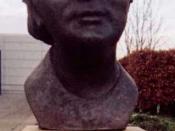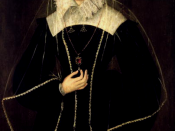2030101B Critical Essay Question 6 Alan Riach
'Lochhead's play is all about scrutinising and reinterpreting history'. Discuss the variety of ways in which Lochhead achieves her aim in Mary Queen of Scots got her head chopped off.
Liz Lochhead's play Mary Queen of Scots Got Her Head Chopped Off depicts the lives of Mary Stewart; Queen of Scotland, and her cousin Elizabeth Tudor; Queen of England. These two women have much in common: both are queens of nations inhabiting the same island. However, they have opposing methods of ruling their respective countries and as such they become enemies rather than allies. Lochhead's interpretation of this historical story examines the women behind their crowns and attempts to represent both of her characters as strong women who refuse to be defined solely by their position but instead by their choices. Lochhead achieves this aim through character development, plot and themes.
One of the major questions Mary Queen of Scots Got Her Head Chopped Off asks the audience to ponder is 'When's a queen a queen and when's a queen just a woman?' (Lochhead, pg.
14) Both Elizabeth and Mary have to face this question themselves. In history they are represented as monarchs: rarely delving into the characters beneath. Their legacies derive from their decisions as heads of state and not from their personal lives. Lochhead questions whether this interpretation is only one which exists in history books and whether there is more to each of these women than their position. She forces her audience to differentiate between Elizabeth and Mary and therefore recognise that one ruler is not identical to another. One way she scrutinises their differences is through their attitudes towards men. Elizabeth states that she would 'rather be a beggar and single than a queen and married.' (Lochhead pg.


